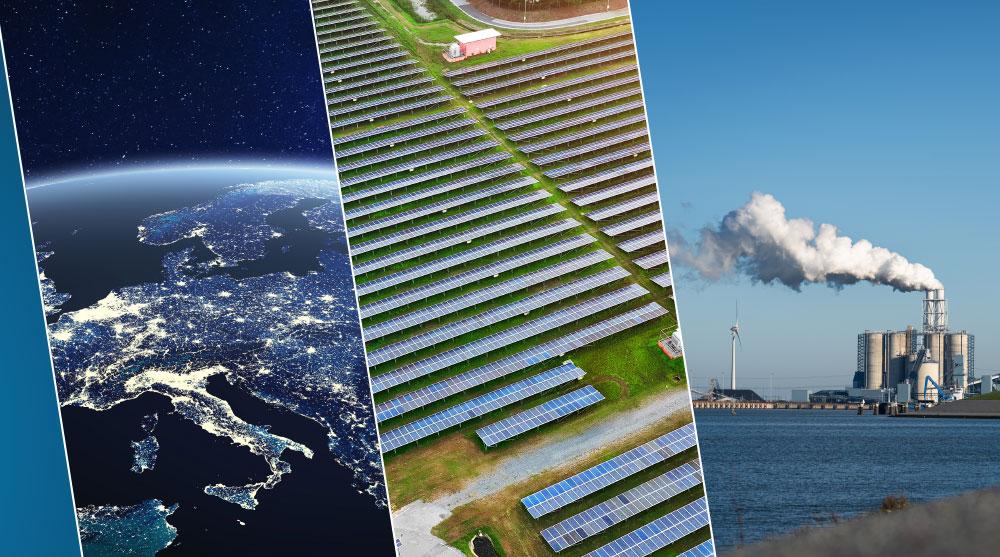In focus: EU leading the global energy transition
November 18, 2024

Forward-looking EU policies, with people and the economy at their heart, position Europe to become the world’s first climate-neutral continent by 2050.
The EU has proven that the clean energy transition doesn’t have to come at the expense of economic growth and prosperity. In 2023, renewable energy accounted for 50% of the EU’s electricity production. We steadily move away from polluting fossil fuels, replacing them with clean alternatives, while Gross Domestic Product (GDP) continues to rise, showcasing what is possible on the path to achieving the European Green Deal.
EU progress is important, but climate change remains a global challenge, and as such, demands urgent global action. With 27 EU countries responsible for some 8% of global greenhouse gas (GHG) emissions, many other world actors are needed to turn the tide. Guided by the EU Strategy for External Energy Engagement, the EU is therefore pursuing a bold agenda to promote a fair, sustainable, and ambitious global energy transition, which leaves no one behind.
COP29, the 29th conference of world leaders on climate change, currently taking place in Baku, Azerbaijan, is an important moment to take stock of the progress achieved so far and make a renewed push for more ambitious action to tackle climate change.
Tripling renewable energy, doubling energy efficiency
Last year at COP28 in Dubai, European Commission President Ursula von der Leyen launched the EU-led Global Pledge on Renewables and Energy Efficiency.
The pledge aims for the world to triple the global installed capacity of renewable energy sources (to at least 11 TW) and double the global rate of energy efficiency improvements from about 2% to over 4% by 2030. With their inclusion in the Global Stocktake, all 198 countries party to the United Nations Framework Convention on Climate Change are committed to these targets.
Implemented together, these commitments will also allow the world to meet a rising energy demand with clean power and move away from unabated fossil fuels at a pace in line with the legally binding Paris Agreement to limit global warming to 1.5°C, compared to pre-industrial levels.
The International Energy Agency estimates that, thanks to record levels of deployment in recent years, the world is approaching the adequate rate of progress for renewable energy. On energy efficiency, much more efforts are needed, notably in terms of electrification and energy efficiency in buildings.
To close this gap and address the remaining bottlenecks for clean power deployment, the EU will support the COP29 Global Pledge on Grids and Storage, aiming to boost global investment in energy grids, storage, and other flexibility solutions key to ensuring clean energy can be deployed and consumed efficiently.
The International Renewable Energy Agency‘s ‘3xRenewables- for the planet & its people‘ campaign highlights the urgency of tripling the world’s renewable power capacity by 2030 through a range of infographics, videos and related studies.
Cutting methane emissions
While accelerating the ongoing transition to cleaner energy sources, the EU is also acting to reduce emissions from the fossil fuels we are still using. At present, cutting methane emissions from oil, gas and coal production is the most immediate opportunity to slow down global warming. It is also highly cost-effective, and often cost-neutral or cost-negative as the methane that is no longer leaked becomes marketable and can therefore recover the cost of investing in cutting methane emissions.
The UNEP report from 24 October confirms it is possible to reach the 1.5°C goal, but only if globally all greenhouse gas emissions are cut and if the current commitments for 2030 are actually met.
Accordingly, as part of its participation at COP29, the Commission last week launched a roadmap to ramp up collaboration on methane emissions abatement between global importers and exporters.
The roadmap marks the EU’s continued leadership on reducing global methane emissions. It builds on the EU-U.S.-led Global Methane Pledge, a voluntary global initiative with 158 country signatories, to cut global methane emissions by 30% by 2030. It further supports the international dimension of the EU Methane Regulation which entered into force in August this year and addresses the methane emissions associated with the EU’s imports of fossil fuels.
Global energy partnerships
As well as engaging in ambitious action at international level, building partnerships directly with countries around the world is central to the EU’s energy diplomacy.
In recent years, the EU has signed several ‘Memorandums of Understanding‘, including on renewable energy, energy security and renewable hydrogen, with countries across Africa, Asia and South America. Such partnerships pave the way for a more sustainable energy future and contribute to eliminating EU reliance on Russian fossil fuels, under the REPowerEU plan.
Securing sustainable supplies of critical raw materials, such as those needed for electric vehicle batteries, solar panels, and wind turbines, is also central to the EU’s energy diplomacy efforts. Establishing reliable and diversified supply chains with a range of countries will allow the EU to avoid over-reliance on single country suppliers for these essential components.
The EU will also launch new ‘clean trade and investments partnerships’ to further strengthen relations with non-EU countries, as announced by President von der Leyen, as part of the Commission’s political guidelines 2024-2029.
Related links
Search
RECENT PRESS RELEASES
Related Post



